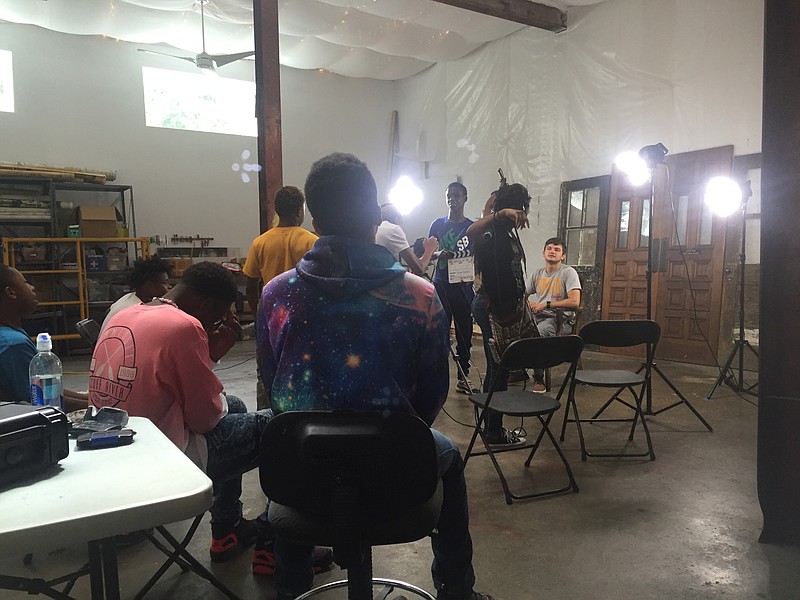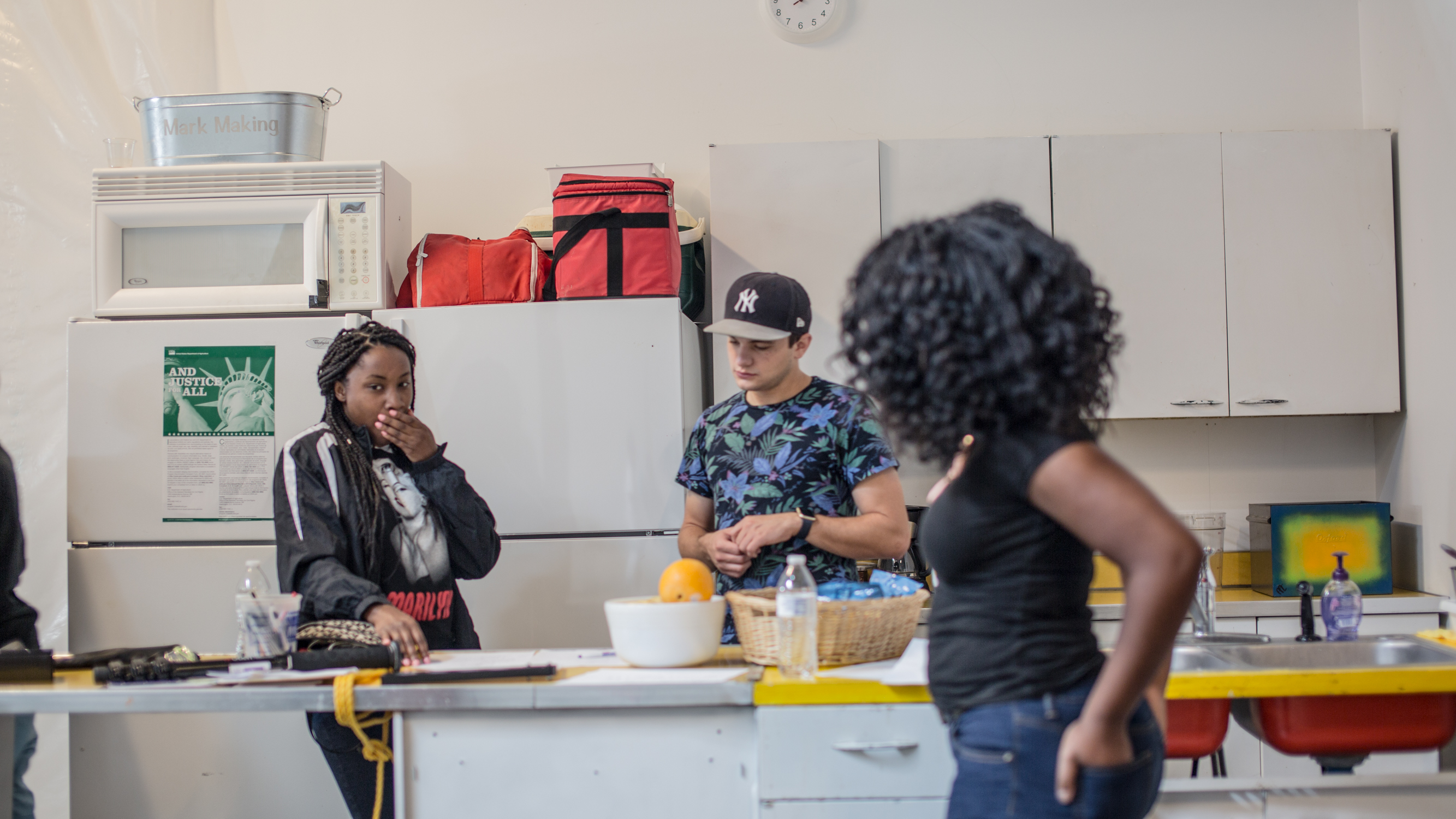To watch more
The videos created by the teens in the Magic Marker program can be seen at magicmarkers.org or at youtube.com/magicmarkers2016.
‘Stop the Violence’
All I really care about is keeping it 100Any lil’ thing, baby, ask for itI ain’t worried about the moneyI’m just tryna feed the hungryEverybody get a lil’ piece of pie for itAll lives matter if you wanna get to itGotta stick together if you wanna get through itStrong, bright future is the wayyou gotta do itStaying in school and staying in booksKids to grow gotta stay off FacebookAll them happy days came and got tookGrow up from the ‘hood,Then you smarter than you lookBefore you have a kid,Turn the page in the bookWhen you see them words,You gonna take a close lookWhen you live that life,You gonna think you’re on a hook.Stop the violence,stop the madnessIt’s a shameEvery time I check my phone see RIPI’m so sick of seeing thisRepeated almost dailyThey fighting for powerBut don’t they knowPower is in a bookGain knowledge and confidence and really have ’em shookWhen I was 3 it’s lollipopsNow I’m 16 it’s gunshotsI just wanna get to a point where the violenceJust stop (me, you say together).When are we going to realizeThis word is not black and whiteWhen will we open up our eyesTo everything in sightWe’re killing all our people,It’s gotten out of controlHow can we push this movementIf we don’t even know where to goWe are the future of our nationSo let’s come together as oneLet’s bring awareness to our movementAnd put down all of our guns.— by Amari Johnson, Aiyanna Jenkins and Emrie Pinkerton
Inside the Mark Making facility in East Chattanooga, five teenage, would-be filmmakers are discussing the rap video called "Stop the Violence" they've been making for the last two weeks.
An equal number of teens are in the other room, setting up lighting and a microphone in preparation for doing some interviews with members of the community for a short film that will accompany the video.
The atmosphere is relaxed and friendly. Guests are greeted with lots of smiles, handshakes and "Thanks for coming" comments from the teens.
Mark Making, located on North Chamberlain Avenue, is an organization that uses art to transform communities and empower individuals, and the video and short film are part of a summer program called Magic Markers.
The five gathered teens, of the total group of 10 ranging in age from 15 to 17, are eager to answer questions about their project. They are here to hone work-readiness skills as well as to learn what it takes to create something using only their imaginations and the film know-how they must quickly master while working with others.
As part of the two-week program, the students are learning about recording sound, setting up lighting, framing a shot in the camera and writing a script, as well as the importance of things like being on time and fulfilling your obligations no matter how small.
Some of the lessons are anything but small.
"I like editing," says Aiyanna Jenkins, 16. "It's awesome."
"I hate it," counters Chrystion McKibben, 15. "It's so tedious and boring."
"But you get to decide what happens," Jenkins replies.
A big part of Magic Markers is to show the young people that they can, in fact, decide what happens in their lives. It also tries to show them how to make smart decisions and to give them skills they need to make it in the workplace. Filmmaking is just the vehicle for doing that, according to Program Coordinator Alli Dozet.
"A film set has so many roles with an absolute necessity," she says. "It's important that everyone on the set steps up into their role and completes his or her task."
Mark Making Executive Director Phyllis Mescon says the program is "teaching work skills."
"The teens have to work together and collaborate," she says, "so they are learning soft skills like communicating, arriving early or at least on time and doing the work when they get here."
When apprentices in this final session first gathered on July 25, they were introduced to each other then began learning about the equipment. The camera belongs to Dozet, and the lights and sound equipment is on loan from the Chattanooga Public Library. Baylor School donated four Mac computers for the summer.
The teens making the rap video, which premiered Friday at the Mark Making facility, are the third of three 10-people sessions that made up the Magic Marker program. The first group featured primarily teens from East Chattanooga, but organizers soon realized that the base needed to be broadened for a more diverse group of kids.
Dozet says the first group was filled with kids who all knew each other, but many had family members in rival gangs and that caused some issues initially. But the teens quickly resolved them and got to work on their projects, she says, which resulted in one short video about homelessness and another about suicide.
"They picked the topics," says Mescon.
One person suggesting that the group should be more diverse was Chrystion McKibben, a member of the first group who has been hired to advise the third group.
"I thought it would be better if they didn't know each other," he says. "It would make it different and make people work to get to know new people."
Emrie Pinkerton, 17, who knows about working thanks to the four part-time jobs she has in addition to the Magic Marker program, says making the video is a fun way for the other teens to learn about working.
"You have to come in early, communicate with your co-workers and actually do the work," she says, emphasizing the last part with a laugh.
She adds that, while she would encourage people to join the program next summer, it's really only for people who enjoy the creative process.
"It can be slow and boring if you are not into the process," she says. There are a lot of hurry-up-and-wait moments, she explains.
Students also have financial stipends thanks to a $15,000 grant from the George R. Johnson Family Foundation. Dozet keeps a daily log of the teens' performance, grading them on professionalism, communication, cellphone use, being disrespectful, conflict resolution, using foul language, teamwork, being on time and productivity. Top earners are paid $300 for their two weeks, while those scoring in the moderate range earn $240 and the next lowest figure is $190. Not showing up will net you no pay.
Not everyone has been paid the full amount available, and Dozet says she has had to explain to some of the apprentices why they didn't get the full amount. "Everyone understood why they got what they got."
Jenkins, with a big head of curly hair and an even bigger smile, is at first reserved, giving one-word answers, but once the topic turns to filmmaking, the excitement bubbles out of her. She says she likes seeing herself on camera, but primarily enjoys being in control and telling stories as an editor or director.
"I want to study it in college (at either Vanderbilt University or Spelman College)," she says. "We did a project where we all had to shoot the same thing but edit it our own way. I liked that. You can do it so many ways."
Amari Johnson, 15, writes raps as a hobby, and many teens in the group are surrounded by violence on a daily basis, so the conversation naturally turned to doing an anti-violence rap video, he says.
"It's just what I know," he says.
Contact Barry Courter at bcourter@timesfreepress.com or 423-757-6354.

